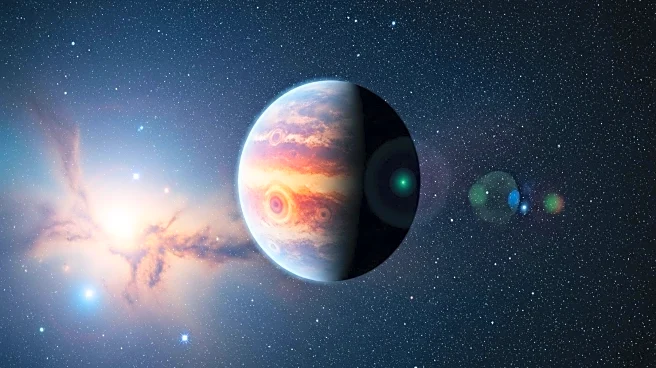What's Happening?
NASA has officially confirmed the existence of 6,000 exoplanets, marking a significant milestone in the exploration of planets outside our solar system. This achievement is the result of decades of research and observations conducted by NASA's space telescopes, which have revolutionized humanity's understanding of the universe. The Exoplanet Science Institute at Caltech's IPAC in Pasadena, California, monitors the count, with over 8,000 additional candidate planets awaiting confirmation. The discovery of these exoplanets has provided insights into the diversity of planetary systems, revealing planets with unique characteristics such as Jupiter-sized planets orbiting closer to their stars than Mercury does to the Sun, and planets with unusual compositions like lava-covered surfaces or clouds made of gemstones.
Why It's Important?
The confirmation of 6,000 exoplanets underscores NASA's leadership in the search for life beyond Earth, a quest that has profound implications for understanding our place in the universe. This milestone not only highlights the technological advancements in space exploration but also sets the stage for future missions aimed at discovering Earth-like planets and studying their atmospheres for biosignatures. The diversity of exoplanets discovered challenges existing models of planetary formation and offers new avenues for research into the conditions that might support life. As NASA continues to develop new technologies, such as the Roman Coronagraph, the potential to directly image Earth-like planets increases, promising further breakthroughs in the quest to answer whether we are alone in the universe.
What's Next?
NASA plans to continue its exploration of exoplanets with upcoming missions like the Nancy Grace Roman Space Telescope, which will employ gravitational microlensing to discover new planets. The agency is also working on the Habitable Worlds Observatory, a concept mission designed to detect Earth-like planets by overcoming the challenge of starlight glare. These initiatives aim to enhance our understanding of planetary systems and the potential for life beyond Earth. The ongoing collaboration with the European Space Agency's Gaia mission is expected to yield thousands of additional exoplanet candidates, further accelerating the rate of discoveries and expanding the catalog of known exoplanets.
Beyond the Headlines
The discovery of diverse exoplanets not only advances scientific knowledge but also raises ethical and philosophical questions about humanity's role in the universe. As technology enables the detection of potentially habitable worlds, discussions about the implications of finding extraterrestrial life become increasingly relevant. The exploration of exoplanets also highlights the importance of international collaboration in space research, as global efforts are crucial for maximizing the potential of missions and sharing discoveries that benefit all of humanity.










